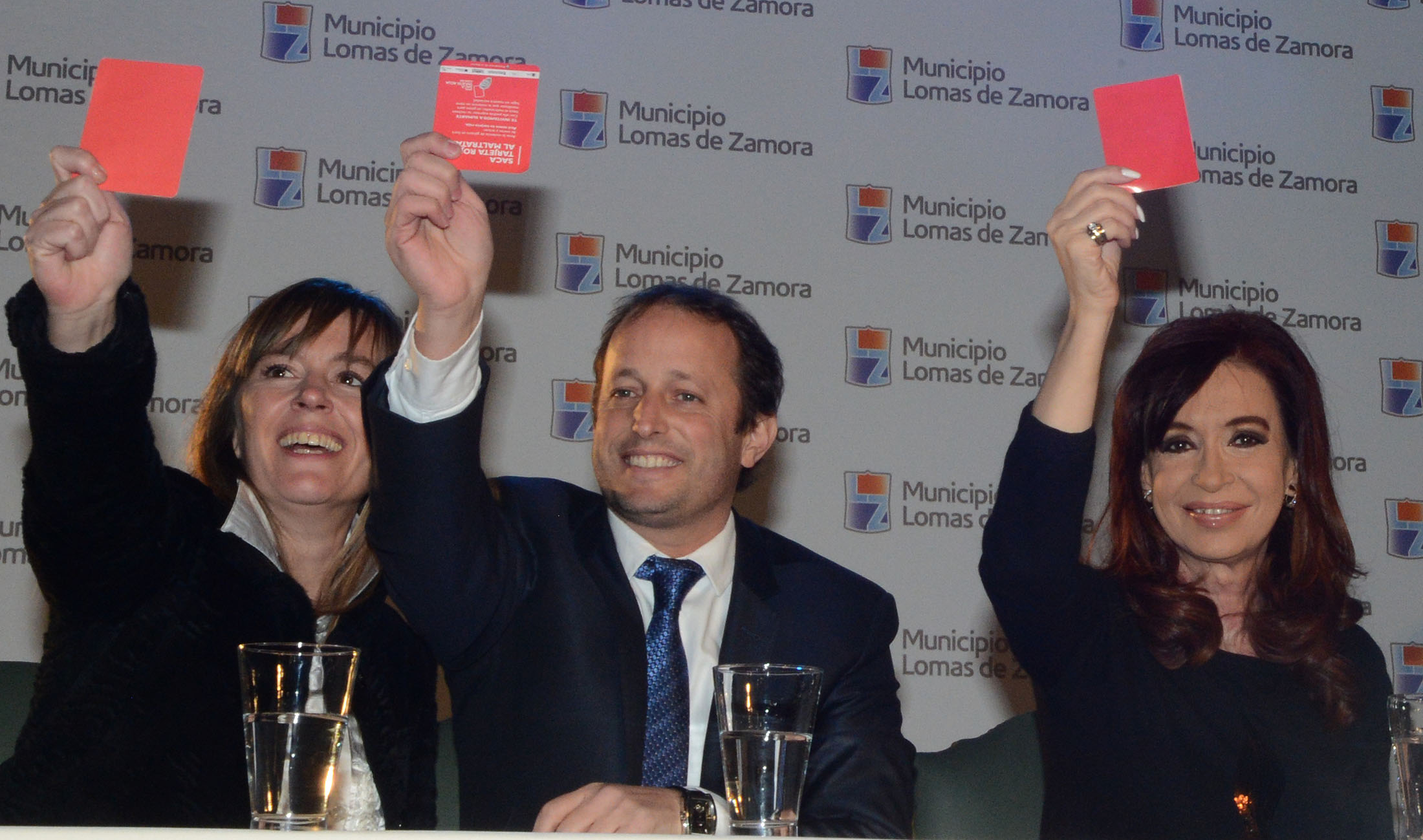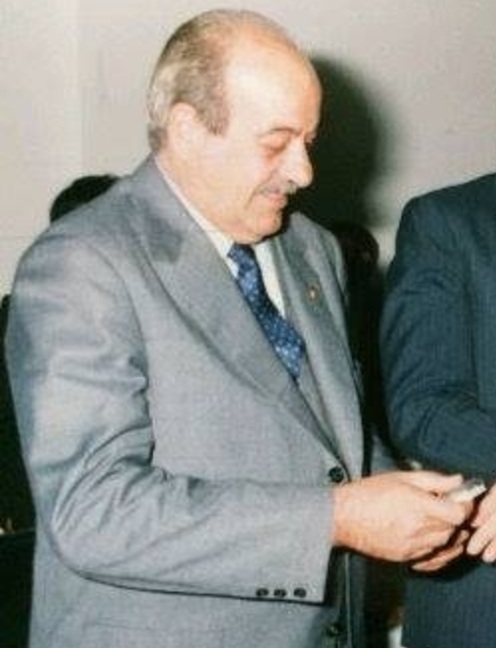|
Juliana Di Tullio
Juliana Di Tullio (born 22 October 1971) is an Argentine psychologist and politician. A member of the Justicialist Party, Di Tullio served three terms as National Deputy representing Buenos Aires Province, from 2005 to 2017. From 2013 to 2015, during the presidency of Cristina Fernández de Kirchner, Di Tullio was president of the Front for Victory parliamentary bloc in the lower chamber of the National Congress. She also served as a member of the Mercosur Parliament, and in the board of directors of the Banco Provincia. Since 2021, she has been a National Senator for Buenos Aires Province. During her time in the lower chamber of Congress, Di Tullio was known for sponsoring a number of bills that expanded the rights of women and LGBT people in Argentina. She co-sponsored the Gender Identity Law, the Equal Marriage Law, and an early bill that would have legalized abortion. Early life and education Juliana Di Tullio was born on 22 October 1971 in Morón, in the Greater Buen ... [...More Info...] [...Related Items...] OR: [Wikipedia] [Google] [Baidu] |
Argentine Senate
The Honorable Senate of the Argentine Nation ( es, Honorable Senado de la Nación Argentina) is the upper house of the National Congress of Argentina. Overview The National Senate was established by the Argentine Confederation on July 29, 1854, pursuant to Articles 46 to 54 of the 1853 Constitution. There are 72 members: three for each province and three for the Autonomous City of Buenos Aires. The number of senators per province was raised from two to three following the 1994 amendment of the Argentine Constitution as well as the addition of the Autonomous City of Buenos Aires' senators. Those changes took effect following the May 14, 1995, general elections. Senators are elected to six-year terms by direct election on a provincial basis, with the party with the most votes being awarded two of the province's senate seats and the second-place party receiving the third seat. Historically, Senators were indirectly elected to nine-year terms by each provincial legislature. The ... [...More Info...] [...Related Items...] OR: [Wikipedia] [Google] [Baidu] |
Same-sex Marriage In Argentina
Same-sex marriage in Argentina has been legal since July 22, 2010. A bill to legalize same-sex marriage was passed by the Chamber of Deputies on May 5, 2010, and by the Senate on July 15. President Cristina Fernández de Kirchner gave her assent on July 21, and the law went into effect the following day. Argentina was the first country in Latin America, the second in the Americas and the Hispanic world, and the second in the Southern Hemisphere to legalize same-sex marriage. It was the tenth country worldwide to do so. Civil unions have also been available nationwide since 2015, providing some of the rights of marriage. Civil unions In the first decade of the 21st century, civil unions ( es, unión civil or ''unión convivencial''); gn, joaju mbarete; cy, uniad sifil were legalized in four jurisdictions in Argentina: the Autonomous City of Buenos Aires (2002), the province of Río Negro (2003), the city of Villa Carlos Paz (2007), and the city of Río Cuarto (2009). Civ ... [...More Info...] [...Related Items...] OR: [Wikipedia] [Google] [Baidu] |
2005 Argentine Legislative Election
Argentina held national parliamentary elections on Sunday, 23 October 2005. For the purpose of these elections, each of the 23 provinces and the Autonomous City of Buenos Aires are considered electoral districts. Each district elected a number of members of the Lower House (the Argentine Chamber of Deputies) roughly proportional to their population. Eight districts (Buenos Aires, Formosa, Jujuy, La Rioja, Misiones, San Juan, San Luis, and Santa Cruz) also elected members to the Upper House of Congress (the Argentine Senate); as usual, three senators were elected (two for the majority, one for the first minority). In most provinces, the national elections were conducted in parallel with local ones, whereby a number of municipalities elected legislative officials (''concejales'') and in some cases also a mayor (or the equivalent executive post). Each provincial election followed local regulations. A number of districts had held primary elections beforehand. In most cases, prima ... [...More Info...] [...Related Items...] OR: [Wikipedia] [Google] [Baidu] |
Ministry Of Foreign Affairs And Worship
The Ministry of Foreign Affairs, International Trade and Worship ( es, Ministerio de Relaciones Exteriores, Comercio Internacional y Culto; MRECIC), informally referred to as the Chancellery ( es, Cancillería), is the Government of Argentina, Argentine government Ministries of the Argentine Republic, ministry dealing with the foreign relations of Argentina, Argentina's foreign policy, international development, international trade, diaspora and matters dealing with Mercosur and the Catholic Church. The Ministry of Foreign Affairs is one of the oldest continuously existing portfolios in the Argentine government, having existed uninterruptedly since the formation of the first Argentine executive in 1854, in the presidency of Justo José de Urquiza. The incumbent minister is Santiago Cafiero, who has served since 20 September 2021 in the cabinet of Alberto Fernández. Structure and dependencies The Ministry's Department of Worship (''Secretaría de Culto'') has several directorat ... [...More Info...] [...Related Items...] OR: [Wikipedia] [Google] [Baidu] |
Santa Cruz Province, Argentina
Santa Cruz Province ( es, Provincia de Santa Cruz, , 'Holy Cross') is a province of Argentina, located in the southern part of the country, in Patagonia. It borders Chubut Province to the north, and Chile to the west and south, with an Atlantic coast on its east. Santa Cruz is the second-largest province of the country (after Buenos Aires Province), and the least densely populated in mainland Argentina. The indigenous people of the province are the Tehuelches, who despite European exploration from the 16th century onwards, retained independence until the late 19th century. Soon after the Conquest of the Desert in the 1870s, the area was organised as the Territory of Santa Cruz, named after its original capital in Puerto Santa Cruz. The capital moved to Rio Gallegos in 1888 and has remained there ever since. Immigrants from various European countries came to the territory in the late 19th and early 20th century during a gold rush. Santa Cruz became a province of Argentina in 195 ... [...More Info...] [...Related Items...] OR: [Wikipedia] [Google] [Baidu] |
Governor Of Santa Cruz Province
The Governor of Santa Cruz ( es, Gobernador de la Provincia de Santa Cruz) is a citizen of the Santa Cruz Province, in Argentina, holding the office of governor for the corresponding period. The governor is elected alongside a vice-governor. Since 2015, the governor of Santa Cruz has been Alicia Kirchner. Governors since 1983 See also * Chamber of Deputies of Santa Cruz References External linksOfficial site {{DEFAULTSORT:List Of Governors Of Santa Cruz Governors A governor is an administrative leader and head of a polity or political region, ranking under the head of state and in some cases, such as governors-general, as the head of state's official representative. Depending on the type of political ... Santa Cruz, Governors of Santa Cruz *List ... [...More Info...] [...Related Items...] OR: [Wikipedia] [Google] [Baidu] |
Néstor Kirchner
Néstor Carlos Kirchner (; 25 February 195027 October 2010) was an Argentine lawyer and politician who served as the President of Argentina from 2003 to 2007, Governor of Santa Cruz Province from 1991 to 2003, Secretary General of UNASUR and the first gentleman during the first tenure of his wife, Cristina Fernández de Kirchner. He was President of the Justicialist Party from 2008 to 2010. Ideologically, he identified himself as a Peronist and a progressive, with his political approach called Kirchnerism.BBC News. 18 April 2006Analysis: Latin America's new left axis./ref> Born in Río Gallegos, Santa Cruz, Kirchner studied law at the National University of La Plata. He met and married Cristina Fernández at this time, returned with her to Río Gallegos at graduation, and opened a law firm. Commentators have criticized him for a lack of legal activism during the Dirty War, an issue he would involve himself in as president. Kirchner ran for mayor of Río Gallegos in 1987 ... [...More Info...] [...Related Items...] OR: [Wikipedia] [Google] [Baidu] |
Social Psychology
Social psychology is the scientific study of how thoughts, feelings, and behaviors are influenced by the real or imagined presence of other people or by social norms. Social psychologists typically explain human behavior as a result of the relationship between mental states and social situations, studying the social conditions under which thoughts, feelings, and behaviors occur, and how these variables influence social interactions. History Although issues in social psychology have been discussed in philosophy for much of human history, the scientific discipline of social psychology formally began in the late 19th to early 20th century. 19th century In the 19th century, social psychology began to emerge from the larger field of psychology. At the time, many psychologists were concerned with developing concrete explanations for the different aspects of human nature. They attempted to discover concrete cause-and-effect relationships that explained social interactions. ... [...More Info...] [...Related Items...] OR: [Wikipedia] [Google] [Baidu] |
Peronist
Peronism, also called justicialism,. The Justicialist Party is the main Peronist party in Argentina, it derives its name from the concept of social justice., name=, group= is an Argentine political movement based on the ideas and legacy of Argentine ruler Juan Perón (1895–1974). It has been an influential movement in 20th and 21st century Argentine politics. Since 1946, Peronists have won 10 out of the 13 presidential elections in which they have been allowed to run. The main Peronist party is the Justicialist Party. The policies of Peronist presidents have differed greatly, but the general ideology has been described as "a vague blend of nationalism and labourism" or populism. Perón became Argentina's labour secretary after participating in the 1943 military coup and was elected president of Argentina in 1946. He introduced social programs that benefited the working class, supported labor unions and called for additional involvement of the state in the economy. In ... [...More Info...] [...Related Items...] OR: [Wikipedia] [Google] [Baidu] |
Italians In Argentina
Italian Argentines ( it, italo-argentini; es, ítalo-argentinos, or ''tanos'' in Rioplatense Spanish) are Italian-born people (born in Argentina or Italy) or non-Italian citizens of Italian descent residing in Argentina. Italian is the largest single ethnic origin of modern Argentines. In 2011, it was estimated that at least 25 million Argentines (62.5% of the country's population) have some degree of Italian ancestry. Argentina has the second-largest community of Italians outside of Italy, after Brazil. Italians began arriving in Argentina in large numbers from 1857 to 1940, totaling 44.9% of the entire postcolonial immigrant population, more than from any other country (including Spain, at 31.5%). In 1996, the population of Argentines of partial or full Italian descent numbered 15.8 million when Argentina's population was approximately 34.5 million, meaning they represented 45.5% of the population. Italian settlements in Argentina, along with Spanish settlements, formed the b ... [...More Info...] [...Related Items...] OR: [Wikipedia] [Google] [Baidu] |







